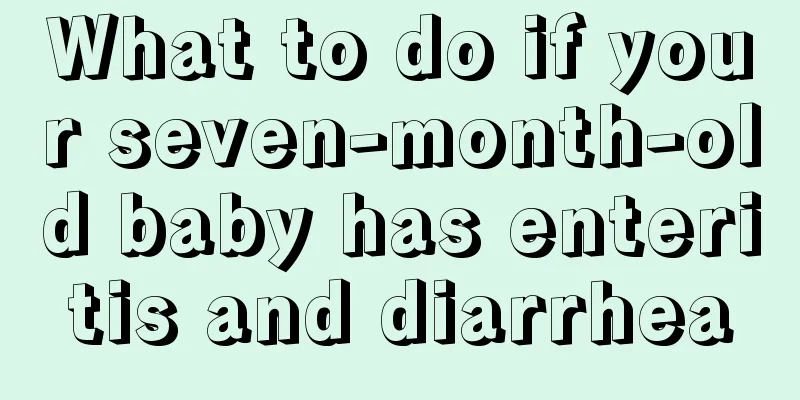What should I do if my baby has a bloated stomach and diarrhea at eight months old?

|
If your baby has abdominal distension and diarrhea, it is mostly caused by gastrointestinal dysfunction. Parents can give their baby probiotics to regulate their baby's gastrointestinal tract and massage their baby's abdomen more often. If the symptoms cannot be relieved after a while, it is best to take the child to the hospital in time for relevant examinations. Based on the examination results, actively cooperate with the doctor for treatment and eat more easily digestible foods. Symptoms of abdominal distension in babies 1. The baby's belly is swollen and tight, and the mother can feel something like a lump in the baby's abdomen with her hand. 2. The baby's stomach feels tender, and the baby will cry loudly when the stomach is pressed. 3. The baby will experience shortness of breath when the abdomen is bloated. 4. In addition to a bloated belly, babies may also experience vomiting, loss of appetite, weight loss, and even fever and bloody stools. The baby's physiological abdominal distension usually manifests as a bloated abdomen after eating. If the above situation occurs, it may be caused by pathological factors, such as a tumor in the baby's abdomen, enlargement of the abdominal parenchymal organs, ascites, or problems with the urinary system. If this happens, the baby must be sent to the hospital immediately and treated after the doctor makes further diagnosis. Causes of baby's abdominal distension 1. When the baby is eating, he inhales air into his stomach due to sucking too quickly. Especially when the baby is hungry for too long before feeding, it is easier for him to suck too quickly and inhale a lot of air. 2. The hole of the nipple of the bottle is not of appropriate size, causing air to enter the baby's body through the gap in the nipple when feeding. 3. Improper breastfeeding method. When bottle-feeding your baby, due to improper feeding posture and method, such as tilting the bottle too much, the milk does not completely block the nipple, but leaves space on the top, causing the baby to inhale a lot of air. 4. The baby produces gas when digesting food. The inhaled milk or other food is fermented in the digestive tract by intestinal bacteria and other digestive enzymes, producing a large amount of gas. These gases fill the baby's intestines and cause abdominal distension. 5. Baby is constipated. If the baby does not have a bowel movement for several days, the excrement will accumulate in the body and cause abdominal distension. 6. When the baby cries, he inhales a lot of air, causing abdominal distension. 7. The abdominal muscles and nerve control abilities of newborns are immature, and they lack elastic tissue, which makes it easy for air to remain in the intestines and difficult to expel through farting or defecation, which can easily lead to abdominal distension and pain. 8. Babies cry for a long time due to the pain and discomfort caused by abdominal distension, which will make it easier for them to swallow air, aggravating the pain, creating a vicious cycle and making the abdominal distension symptoms worse. |
<<: The baby's face is red when he is born
>>: What to do if a four-month-old baby has diarrhea due to a cold stomach
Recommend
What medicine should a 4-year-old baby take for toothache
Toothache in babies is a common problem and also ...
How to remedy myopia in children
With the development of the Internet, more and mo...
How to teach children to bend down
Bending back is a basic movement in dance and it ...
What are the symptoms of gastroenteritis in children?
Children are prone to gastroenteritis due to thei...
What should children pay attention to when swimming in summer?
The hot weather in summer makes people just want ...
What should I do if my one-year-old baby has nasal mucus?
Many parents complain that there is booger in the...
What should I do if my premature baby has bloating?
Babies are more prone to bloating, especially whe...
The child has difficulty breathing. What's going on?
As children grow physically, their organs will al...
What is mycoplasma in children?
Maybe many mothers don’t know what kind of diseas...
How many times a day should a 50-day-old baby poop?
After birth, newborns will defecate almost every ...
What are the symptoms of neonatal protein allergy?
We know that most of the children are only childr...
What causes premature babies to have a fast heart rate?
A fast heart rate in premature babies is often re...
How to prevent diarrhea in babies who are half a month old
Children nowadays have very good economic conditi...
What can primary school students eat to improve their memory?
What should primary school students eat to improv...
Can babies with urticaria take a bath?
Bathing is an activity that everyone does. It is ...









